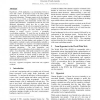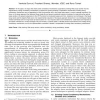100 search results - page 1 / 20 » Reducing Cognitive Overhead on the World Wide Web |
ACSC
2002
IEEE
13 years 9 months ago
2002
IEEE
HyperScout, a Web application, is an intermediary between a server and a client. It intercepts a page to the client, gathers information on each link, and annotates each link with...
CHI
1997
ACM
13 years 8 months ago
1997
ACM
In this paper, we report on users' revisitation patterns to World Wide Web (WWW) pages, and use the results to lay an empirical foundation for the design of history mechanism...
CN
2000
13 years 4 months ago
2000
This paper discusses methods to generate and display automatically additional hyperlink information to the users of the World Wide Web. Current Web browsers make it hard to predic...
INFOCOM
2000
IEEE
13 years 9 months ago
2000
IEEE
—In this paper, we argue that weak cache consistency mechanisms supported by existing Web proxy caches must be augmented by strong consistency mechanisms to support the growing d...
UIST
1997
ACM
13 years 8 months ago
1997
ACM
The World-Wide Web is becoming an invaluable source for the information needs of many users. However, current browsers are still primitive, in that they do not support many of the...


